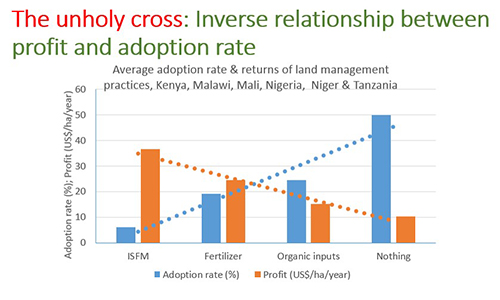Adopting integrated soil fertility management (ISFM)—practices that combine organic inputs and judicious amounts of inorganic fertilizer and improved seeds—offers farmers a higher profit and is more sustainable than using inorganic fertilizer. Yet its adoption rates across Africa south of the Sahara (SSA) are among the lowest worldwide.
As I presented at an Ag Sector Council seminar earlier today, a recent study conducted as part of an IFPRI economics of land degradation project has revealed an inverse relationship between profit and adoption rate of most non-ISFM fertility practices (see figure below). In the same study, ISFM was shown to reduce climate-related production risks.
Why are African farmers not adopting ISFM practices? One reason is that agricultural extension agents simply don’t have sufficient capacity to advise farmers on ISFM, climate change, and other global change-related farming practices. In addition, ISFM requires more labor than other practices, and governments are not investing in developing and supporting them.
How can farmers be encouraged to switch? An experiment conducted in Malawi showed that, without exception, all farmers responded to ISFM incentives offered on the condition that they plant agroforestry trees or adopt conservation agriculture. This implies that adoption of ISFM could be increased by:
- offering short-term training for agricultural extension agents on ISFM, climate change, and other new farming technologies;
- conditioning benefits to easily verifiable organic soil fertility management practices, such as agroforestry, that will more than reduce the current cost of subsidies, yet increase yield and profit; and
- promoting agroforestry and other plant-based organic soil fertility management practices to reduce the high labor intensity of ISFM.







